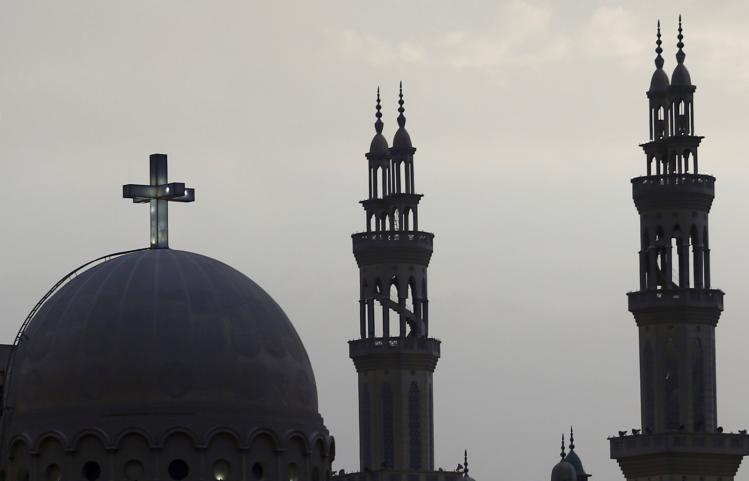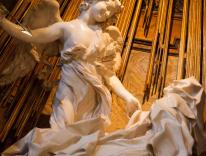
Pope Francis is about to arrive in Egypt on a trip that will include a visit to the Grand Imam of Al-Azhar (Sunni Islam’s most prestigious university); an address to participants in the International Conference on Peace; a meeting with Pope Tawadros II of the Coptic Orthodox Church of Alexandria; celebration of a stadium Mass; lunch with Egyptian bishops; and a prayer meeting with clergy, religious men and women, and seminarians. Despite appearances, though, the trip isn’t only or primarily about inter-religious dialogue.
Recent tradition has it that papal visits to countries where religion and international politics can’t be separated should stick to the “strictly religious.” This can be traced to Paul VI’s pilgrimage to the Holy Land in January 1964. At Vatican II, the “strictly religious” aspect of inter-religious dialogue was necessitated by the opposition of Catholic bishops from Arab countries to any gesture from the council that could possibly be interpreted as legitimization of the state of Israel. This would have set the small minorities of Catholics in Arab countries at odds with the anti-Israel foreign policy of their governments. It would also have put the embryonic theology of Judaism of many Catholic bishops (not just Arab) in a crisis even deeper than it was already with the purely religious text of Nostra Aetate, approved in October 1965.
In September 1964, during the difficult debate on Nostra Aetate, Cardinal Augustine Bea, president of the Secretariat for Christian Unity created by John XXIII, had to emphasize that Vatican II would not discuss Zionism or the state of Israel, but would have a purely religious scope. Vatican II and Nostra Aetate would usher in a new relationship not only between Catholicism and Judaism, but also between Catholicism and the state of Israel. Yet for all the progress since then in relations between the Catholic Church and the Holy See on one side, and Judaism and the state of Israel on the other, the theological debate still has not touched on the role of the state of Israel.
In the post-Benedict XVI Catholic Church, one of the major issues both theologically and politically is the relationship with Islam. Interviews and statements ahead of Francis’s arrival in Egypt have that familiar “religious, not political” ring. In America, Thomas Michel (currently teaching at the Pontifical Institute for Islamic and Arabic Studies in Rome) downplays the political side of the visit, and narrows its inter-religious scope: “The Second Vatican Council never addresses Islam, never uses the world ‘Islam.’ It always says, the church has great esteem for Muslims. It talks about Muslims always, not about Islam. There is no dialogue with ‘Islam.’” The political situation under Egypt President General Abdel Fatah Al Sisi is also a factor, Michael suggests. “That’s why I think [the pope] is going mainly to Al-Azhar: to meet the religious leaders, not the political leaders.”
But there is an important theological-political aspect to this visit. Just as Vatican II opened the door to dialogue with the state of Israel and not just with Judaism, so Francis is now opening a door to Islam—at a time when an important institution like Al-Azhar is re-examining a key political issue for relations between Christianity and Islam. Two months ago, Al-Azhar hosted a conference on “Freedom, Citizenship, Diversity, and Integration.” It attracted some two hundred participants (Sunni Muslims from all over the world, including Nepal and Pakistan; Shiite Muslims; Yazidis; Protestants; Orthodox Christians; and Catholics), but more significant was the six-point final declaration of the conference, read by the imam of Al-Azhar himself. Point 2 explicitly addresses the concept of citizenship “as as a contract stipulated between citizens, society and the state.” It also cites a
lack of understanding of the concept of citizenship and what it entails leads to talking about ‘minorities’ and their rights. With this as a starting point, the declaration wishes that all men of culture and intellectuals be cautious regarding the risks implied in the use of the term ‘minorities.’ In fact, while it claims to affirm certain rights, it veils a sense of discrimination and separation. In the last couple of years, we have witnessed the re-appearance of the term ‘minorities,’ which we thought we had overcome with the end of colonialism. But it has recently come back into use to create differences between Muslims and Christians, but also between Muslims themselves, considering that it leads to dispersion of allegiance and favours foreign interests.
Antoine Courban, professor at the Jesuit-run St. Joseph University in Beirut, was at the Al-Azhar conference. As he explained to the Vatican Insider, the declaration specifies that in the new “umma” (community) described by Al-Azhar, all citizens are subject to a constitution that is not written by theologians: “The concept of the nation, a word that in Arabic did not exist until the nineteenth century, was interpreted in ethnic or religious terms. Now the most important Sunni institution, al-Azhar, reinterprets it in geographic terms, as the common homeland, where to live together, as equals, without legal majorities and minorities ethnically or religiously defined.”
It’s important to understand the Al-Azhar declaration, one in a series of similar ones it has issued since the 2011 revolution, in a number of contexts: Egypt as whole; the attacks against Christians and Muslims in Egypt; and the downfall of the country’s elected Islamist president, Mohamed Morsi, in 2013. The document should thus be read as part of the ongoing effort of the University of Al-Azhar to, as this report at the Carnegie Endowment for International Peace puts it, “[align] itself firmly with the post-Morsi road map, and [assert] its leadership of religious life throughout Egypt.”
And from a Catholic point of view, the declaration is interesting for two reasons. The first is that the shift in the concept of citizenship from the theological to the constitutional is similar to that advanced by Catholicism in the 20th century and at Vatican II. Especially in the declaration on religious liberty, Dignitatis Humanae (one of the last documents approved by Vatican II, on December 7, 1965), the council fathers demand that “constitutional limits should be set to the powers of government, in order that there may be no encroachment on the rightful freedom of the person and of associations.” The words “constitution” and “constitutional order” are used eight times in the fifteen short paragraphs of the declaration, after a long history of Catholic contempt for the idea of a constitution as something embodying popular sovereignty at the expense of the divine right of the rulers. This shows the link between the theological developments in ecclesiology (in the case of Al-Azhar: the idea of “umma”) and the development in the political role of Catholics in the nation-state (in the case of Al-Azhar: the role of Sunni Muslims).
Second, the Al-Azhar declaration can also be read in light of the debate in the United States on the relationship between religion and citizenship in contemporary America. Fear of a “post-Christian country” is at the center of support for the Benedict option and of the favorable response to it from important American Catholic prelates like Philadelphia Archbishop Charles Chaput and Bishop Robert Barron. True, it’s hard to say what impact (if any) the Benedict option might have on non-American Catholics, especially where Christians have always been a small minority. It would also be an overstatement to say that the Al-Azhar declaration advances the proposal for a post-Muslim, secular state. Yet its emphasis on equal citizenship based on a constitution is certainly a step toward the preference of Middle Eastern Christians for a secular or religiously neutral state.
One of the interesting paradoxes of the relationship between American Christianity and the Middle East is that the former seeks from the latter what it rejects for itself: a more secular constitution. The election of Donald Trump in part reflects a wish to restore a majority/minority country, where that majority (at least for now) remains white and Christian. This was also a subtext of the U.S. bishops’ fight against the Obama administration on the Affordable Care Act, which was built much more on a legal-constitutional argument than on a theological one. Despite the bishops’ non-theological, mostly constitutional understanding of religious liberty, they seem to be reluctant to grant that same understanding when it comes to religious liberty for Muslims. Bishop Joseph Vasquez, chairman of the Committee on Migration, responded to Trump’s travel-ban executive order in January with a statement of support for “Yazidis and Shia Muslims from Syria, Rohingyas from Burma, and other religious minorities,” adding that “we need to protect all our brothers and sisters of all faiths, including Muslims, who have lost family, home, and country.” Yet when USCCB chairmen Timothy Dolan, William Lori, Frank Dewane, and Charles Chaput hailed the president’s draft executive order on religious freedom on February 16, they made no mention of the targeting of Muslims by the Trump administration at all.
Francis’s trip to Egypt is not just another addition to the history of inter-religious dialogue between the Catholic Church and Islam. It’s also part of the larger debate about religion and citizenship in the context of the crisis of the nation-state. The Benedict option as a reaction to the post-Christian nation expresses an illusion about the possibility of withdrawal from the world outside to recreate, on the inside and in smaller communities, a majority complex. It is a proposal that cannot escape the challenge of a new idea of citizenship in a multi-religious and multi-cultural world. In different ways and from different circumstances, Pope Francis and Al-Azhar are trying to articulate a response to the crisis of political authorities and of the nation-state. The task that world religions like Catholicism and Islam share now is to come up with a response against the temptation to replace citizenship among equals with an exclusive, ethno-nationalist, and tribal understanding of religious identity.
